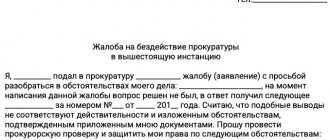During the judicial investigation, violations are often observed, expressed in deliberate non-compliance with the norms of professional regulations on the part of an employee of the Investigative Committee, the central figure of which is the investigator. Taking into account the role of this employee, as well as the consequences of the decisions he makes, if illegal elements are detected in his activities, this should be immediately reported by filing a complaint in the prescribed form.
In this article we will tell you how to file a complaint against the actions of an investigator, where it should be sent and what consequences to expect if it is filed.
Multi-channel free hotline Legal advice on criminal law. Every day from 9.00 to 21.00
Moscow and region: +7 (495) 662-44-36
St. Petersburg: +7 (812) 449-43-40
Who is an investigator?
Investigator - an official of a police agency, investigative committee or FSB. Its task is to investigate crimes, that is, to form an evidence base for prosecution in court.
Despite differences in departmental affiliation, the procedural status of investigators is the same.
According to the law, an investigator is a participant in the process who belongs to the prosecution. Despite this, it obliges him to be objective and collect evidence in favor of the accused. This contradiction leads to the fact that citizens remain defenseless against abuses by officials. The lawyer is quite limited in his capabilities.
The only thing left is to write a complaint about the investigator’s inaction or his actions that violate the law.
The legislative framework
When drawing up a statement and indicating in it legal references confirming the accusations against the investigator, you should be guided by the following legislative norms:
- Federal Law “On the procedure for considering appeals from citizens of the Russian Federation” dated May 2, 2006 No. 59;
- Article 125 Criminal Procedure Code of the Russian Federation;
- Order of the Investigative Committee under the Prosecutor's Office of the Russian Federation dated September 19, 2007 No. 17 (as amended on April 8, 2008). “On the introduction into force of the Instruction on the procedure for considering applications and receiving citizens in the system of the Investigative Committee under the Prosecutor’s Office of the Russian Federation.”
Indication of these legislative norms in the statement of claim against the investigator will significantly reduce the likelihood of refusal to satisfy her requirements and return the document itself to the applicant.
General list of investigator powers
Article 38 of the Code of Criminal Procedure describes the following basic rights and responsibilities of the investigator:
- to initiate criminal proceedings;
- accept it for your proceedings or transfer it to the head of the investigative department;
- select versions of the crime for further development;
- make a decision to conduct investigative actions and send requests for their conduct to the prosecutor’s office or court, if required by law (for example, a search of a residential premises);
- issue instructions to operational units, local inspectors, and investigative bodies to carry out operational activities or investigative actions;
- appeal the decisions of the prosecutor with the permission of the head of the investigation;
- express your disagreement with the prosecutor's comments.
The investigator’s right to appeal the prosecutor’s decisions is limited and applies only to:
- cancellation of the decision to initiate proceedings;
- return of materials to the investigator for additional investigation;
- change in qualifications (which articles of the Criminal Code should be applied);
- change in the scope of the charge (number of episodes of crime);
- drawing up a new indictment or eliminating other deficiencies.
The complaint is submitted to a higher prosecutor, up to the General Prosecutor's Office.
The implementation of these and other rights and obligations of the investigator is carefully described in the section of the Code of Criminal Procedure devoted to the preliminary investigation.
Sample application on how to prove your case
There is no exact form for the official paper, but certain information must be provided.
A sample complaint against the actions of the inquiry body or investigator to the prosecutor includes the following:
- Full name of the representative of the supervisory authority.
- Details of the applicant or his legal representative (lawyer) with address and contact telephone number.
- Number of the criminal case, information about the investigator in whose proceedings it is located.
- The title of the document in large letters in the center of the page.
- Statement of the circumstances of the case, violation of law.
- Links to regulations that regulate these legal relations.
- The word “Please” is in the central part of the page, after which the applicant’s demands are listed (to cancel the decision, compensate for moral, material damage, harm to health, bring the perpetrator to justice).
- Signature and date.
To prove that you are right, it is advisable to attach evidence to the complaint (in the official document they are listed as attachments). These may include the following documents:
- A protocol drawn up by the investigator during procedural actions (for example, interrogation or confrontation).
- A decision by a law enforcement official that needs to be appealed.
- A certificate confirming the harm caused to health (issued at a medical institution).
- Photographs, audio and video recordings that are evidence of violation of rights (the latter can be conveniently attached in an electronic complaint).
The address is filled in formal language, without colloquial expressions. The use of insults and slang is not permitted. If you find it difficult to file a complaint, contact your legal representative (lawyer), who will draw up a document in accordance with all the rules.
What is meant by inaction?
Illegal inaction of an investigator means refusal or evasion of work that he is obliged to do by virtue of the law. Illegal actions also mean going beyond the scope of authority or carrying them out in violation of procedural law.
Violations are considered significant and entail sanctions from the prosecutor or head of the investigative department if they lead to infringement of the rights of citizens or affect the effectiveness of the investigation. However, the last points are closely related.
Examples of inaction:
- refusal to initiate a case;
- refusal to apply measures aimed at securing a civil claim and preserving property that was obtained by criminal means.
- refusal to call a witness or demand evidence that confirms the words of the accused;
- refusal to order an examination;
- unjustified avoidance of investigative action, adoption of a different procedural decision.
The law gives reason to believe that inaction takes absolutely any form, and the author of the complaint is not limited in how to formulate his demands.
Termination of criminal prosecution
First of all, it must be said that the termination of criminal prosecution and the termination of a case are completely different concepts.
A criminal case is initiated as a result of the actions of those subject to the Criminal Code.
So, criminal prosecution is unacceptable :
- The person has no relation to negative events, the qualification of which implies the presence of a crime.
- The citizen has already been punished for the act committed.
- The person is subject to a decree to terminate the criminal case.
- The person has inviolability.
- The citizen has not reached the legal age required for criminal prosecution.
- There is an act of amnesty that provides for the committed act.
- In the presence of active repentance.
Among other things, there are other grounds for closing the case. Each specific case needs to be examined.
Expert commentary
Roslyakov Oleg Vladimirovich
Lawyer, specialization civil law. More than 19 years of experience.
If the actions of employees of the Investigative Committee are aimed at ending the criminal prosecution without reason, then a complaint must be written to the prosecutor about the actions of the investigator. The sample can be downloaded from our website.
Meaning of the complaint
A complaint about the investigator's inaction is of serious importance. It lies in the ability to influence the investigation process, as well as to record violations committed by the investigator if there is still no proper response to the complaint. Thus, she will play a role in the future when the case comes to court.
Despite the abolition of the right to send the case for further investigation, before considering the materials on the merits, the judge has the right to make comments. They are transferred to the prosecutor's office, and from there to the investigator. This procedure is possible as part of a preliminary meeting. At this stage, the question of whether the case is ready for consideration is decided.
Violations ignored in the first instance may play a role at the stage of appeal, cassation or supervision.
How long must a complaint about the investigator’s inaction be considered in 2022?
According to the established procedure, the period for consideration of written and electronic complaints in the Russian Federation is 30 calendar days from the date of registration of the applicant’s appeal. During this period, a full verification of the report of the investigator’s inaction must be carried out. If the information specified in the complaint is confirmed, the following disciplinary sanctions may be applied to the offending employee:
- Disciplinary reprimand or warning;
- Reprimand or severe reprimand;
- Demotion in rank;
- Dismissal from the Investigative Committee.
Note! In accordance with Art. 28 of the Federal Law “On the Investigative Committee of the Russian Federation”, disciplinary sanction cannot be applied later than 6 months from the date of the commission of the offense.
Prosecutor's office
The prosecutor is obliged to ensure supervision over the legality of the investigator’s actions. Employees who are overloaded with work actually only care about one thing – meeting deadlines. It is almost never taken into account how correct the decision is on the merits - there is no time to do this.
An example is the refusal to initiate a case. The prosecutor's office, as a rule, agrees with the investigation. At the same time, if a complaint is filed about the inaction of an investigator in a criminal case, the prosecutor may agree with it.
Which prosecutor's office should I contact? If the case is under the jurisdiction of the district police department or the Investigative Committee, supervision is carried out by the district prosecutor's office.
The FSB is in charge of cases, which are then transferred to a military court, so the military prosecutor's office is in charge of supervision. The same is the case with the military administration of the UK.
In general, oversight of the activities of the FSB is provided by military prosecutors, because state security officers are military personnel.
A complaint to the prosecutor's office about the investigator's inaction is considered a good option, since after going through all the authorities of the prosecutor's office, the applicant still has the right to go to court.
Institutions of appeal
Having made sure that the actions of the investigator really contradict the norms of domestic legislation, you can proceed to drawing up a complaint. But before we tell you how to do this, you should first find out where to file a complaint.
Below are the main authorities in which you can appeal against the unlawful actions of an Investigative Committee employee by filing a complaint.
Head of the investigative institution
In order to speed up the processing of the complaint as much as possible, it should be submitted to the immediate superior of the investigator who violated the law. In this case, the response time to the filed complaint will be no more than 3 days from the moment it is received by the investigative authorities.
In some cases, the consideration period may be somewhat delayed, but in this case the reasons for the delay will be explained.
In most cases, the leadership of the Investigative Committee provides a response to received requests from citizens as soon as possible, since they are interested in ensuring that the “news” about the incompetence of its subordinates does not spread to higher authorities.
Central office of the investigative body
If the situation cannot be resolved at the stage of contacting management, the next step will be filing a complaint with the central office of the Investigative Authority. This method of appealing against unlawful actions of an investigator is one of the most convenient, since it can be carried out directly online.
Today, you can file a complaint with this authority in one of the following ways:
- By sending a registered letter by Russian Post. Address: Moscow per. Technical 2;
- Using the hotline: 8-800-10-01-260;
- By leaving an online complaint at the Internet reception desk on the official portal of the Insurance Company (sledcom.ru).
Before filing a complaint, you should check several times whether the actions taken by the investigator actually fall under the category of “illegal.”
Prosecutor's office
Non-illegal actions or fact of inaction on the part of the investigator can be complained to one of the central government bodies exercising a supervisory function - the prosecutor's office. Currently, you can file a complaint with this authority in the following ways:
- Personal visit to the selected unit of the supervisory authority. It may be a branch of the District, City, Regional or General Prosecutor's Office. It is considered the fastest option for filing a claim against an Investigative Committee employee. It should be borne in mind that when compiling this method, you will need an identification document (passport);
- By means of a power of attorney (through a proxy). When using this appeal method, you should keep in mind that the document that will guide the authorized person when contacting a law enforcement agency must be certified by a notary;
- By post (registered mail with notification of acceptance). It is considered the “slowest” method of filing a complaint, which should be resorted to only if filing one of the above is impossible.
Court
Unlawful actions of the investigator can also be challenged in court. It is allowed to file a complaint against an investigator in court only at the place where criminal proceedings are being considered. Once the complaint is registered, it will be reviewed within the next five days.
Upon review by employees of the state court, one of the following decisions will be made:
- Satisfaction of the complaint with the subsequent recognition of specific actions of the investigator as illegal and his bringing to disciplinary or criminal liability;
- Refusal to satisfy the complaint due to the lack of proper grounds for this.
Courts
Complaints are considered in the first instance by district courts. The application is reviewed by one of his employees. He calls the initiator of the complaint and his representative, most often they are lawyers. Prosecutors represent the state side.
Those who disagree with the judge's decision have the right to file an appeal, cassation and supervisory complaint.
How to file a complaint?
It is submitted either directly to the body authorized to consider it, or to the investigator, who then transfers it to the appropriate structure.
Practice shows that it is better to send materials directly to the head of the investigation, to the court or the prosecutor's office. Otherwise, their transfer will also be delayed. Papers must be given directly to the office or sent by mail.
Persons in custody submit documents through the administration. Examples of complaints submitted from pre-trial detention centers and places of detention show that not all government agencies violate the rights of citizens.
Submitting a complaint through electronic services makes sense if it is duplicated in paper form.










